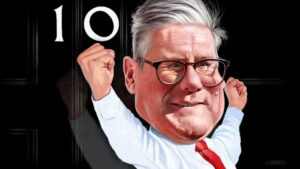Labour’s vote share advanced in Scotland but not at all in the rest of the country, sending Sir Keir to Downing Street with the smallest popular mandate ever
 KRC TIMES Desk
KRC TIMES Desk

Andrew Murray
Pressure is already being piled on new premier Sir Keir Starmer to adopt more radical policies after Labour’s general election victory today. In the most grudging landslide in parliamentary history, Labour assembled a huge Commons majority with half a million fewer votes than Labour secured in the heavy defeat of 2019.
Profiting from the split in the right, which saw the Tories slump to a record low share of the vote, rather than any enthusiasm for Labour, Starmer’s strategy over the last few years of attacking the left was shown to be flawed.
Labour’s vote share advanced in Scotland but not at all in the rest of the country, sending Sir Keir to Downing Street with the smallest popular mandate ever. Starmer pledged in Downing Street, after Rishi Sunak had departed, to lead a government “unburdened by doctrine” and to “end the era of noisy performance.”
He initially confirmed Angela Rayner as Deputy Prime Minister and Rachel Reeves as Chancellor. They will have to manage expectations on the basis of a much feebler electoral performance than anticipated.
TUC general secretary Paul Nowak said that “the trade union movement stands ready to help the new government deliver Labour’s New Deal for Working People,” indicating that the unions expect early movement to deliver pledges on workers’ rights.
And public services union PCS general secretary Fran Heathcote called on Starmer to “work with us to put an end to endemic low pay, job insecurity, privatisation and Tory attacks on Civil Service pensions.” Amnesty International also came forward with its demands today.
The human rights organisation’s UK chief executive Sacha Deshmukh said: “Keir Starmer’s to-do list should include immediately suspending arms sales to Israel, repealing the Illegal Migration and Rwanda Acts, scrapping the grossly unjust Troubles Act, and making human rights universal once more.”
The demand to end arms sales to Israel and end the assault on Gaza will find further force with a mass protest through central London on the issue tomorrow. Stop the War, one of the organisers, said: “As the suffering in Gaza increases it is vital that as many people as possible welcome the new government by demanding an end to the war in Gaza, an end to the genocide and an end to the selling of arms to Israel.”
Labour’s share of the poll was up just 1.6 per cent to 33.7 per cent and down over three million and more than 6 per cent on 2017, meaning the 412 seats won on Thursday represent far less popular support than the party secured under Jeremy Corbyn’s leadership.
The Tory haul of just 121 seats, and its voting share of 23.7 per cent, are the lowest ever. However, some polling had left them still further behind and they remain the official opposition, ahead of the Liberal Democrats who gained 60 seats for a total of 71 on a marginally increased 12 per cent of the poll.
Polling guru Sir John Curtice said that the Tory losses were explained by the growing support for Reform, which won over 14 per cent of the vote and its first five elected MPs, including owner-leader Nigel Farage in Clacton. “This looks more like an election the Conservatives have lost than one Labour have won,” he said.
Indeed, Labour’s commanding Commons position is down to the impact of Reform and the distorting effects of the first-past-the-post system, which will come under renewed scrutiny. Its fragile and limited electoral coalition will face immediate challenges. The Greens won all four of their target seats, including unseating Labour’s Thangam Debbonaire in Bristol Central, and four pro-Gaza independents were elected around the country.

In a particular blow to Starmer, his predecessor as Labour leader, Jeremy Corbyn, retained his seat of Islington North by a clear margin as an independent. Mr Corbyn said after his victory that the result “gives us a glimpse of a different future, which puts the interests of the many ahead of those of the few.
It is also a warning — a warning to the incoming government that dissent cannot be crushed without consequences. “That ideas of equality, justice and peace are eternal. That hope for a better world can never be extinguished,” he said.
Tory infighting started immediately, pitching those looking to work with Reform on a national-populist platform blending culture wars, migrant-baiting and neoliberal economics against “one nation” Conservatives. They must make do without Liz Truss, who saw an immense majority in her South West Norfolk constituency snatched by Labour in perhaps the most memorable scalp of the night.
Other leading Conservatives unseated include cabinet members Penny Mordaunt, Grant Shapps, Gillian Keegan, Alex Chalk, Lucy Frazer, Mark Harper and Michelle Donellan and languid aristocrat Jacob Rees-Mogg.
Chancellor Jeremy Hunt just clung on to his Surrey constituency, but the Tories lost all their 14 seats in Wales and all their 2019 “red wall” gains from Labour. The Scottish National Party faced near wipe-out in the Commons, losing 36 seats to Labour, which reclaimed its position as Scotland’s largest party.




